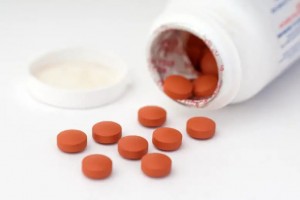Uses
Ibuprofen is used to relieve pain from various conditions such as headache, dental pain, menstrual cramps, muscle aches, or arthritis. It is also used to reduce fever and to relieve minor aches and pain due to the common cold or flu. Ibuprofen is a nonsteroidal anti-inflammatory drug (NSAID). It works by blocking your body’s production of certain natural substances that cause inflammation. This effect helps to decrease swelling, pain, or fever.If you are treating a chronic condition such as arthritis, ask your doctor about non-drug treatments and/or using other medications to treat your pain. See also Warning section.Check the ingredients on the label even if you have used the product before. The manufacturer may have changed the ingredients. Also, products with similar names may contain different ingredients meant for different purposes. Taking the wrong product could harm you.
How to use ibuprofen oral
If you are taking the over-the-counter product, read all directions on the product package before taking this medication. If your doctor has prescribed this medication, read the Medication Guide provided by your pharmacist before you start taking ibuprofen and each time you get a refill. If you have any questions, ask your doctor or pharmacist.
Take this medication by mouth, usually every 4 to 6 hours with a full glass of water (8 ounces/240 milliliters) unless your doctor directs you otherwise. Do not lie down for at least 10 minutes after taking this drug. If you have stomach upset while taking this medication, take it with food, milk, or an antacid.
The dosage is based on your medical condition and response to treatment. To reduce your risk of stomach bleeding and other side effects, take this medication at the lowest effective dose for the shortest possible time. Do not increase your dose or take this drug more often than directed by your doctor or the package label. For ongoing conditions such as arthritis, continue taking this medication as directed by your doctor.
When ibuprofen is used by children, the dose is based on the child’s weight. Read the package directions to find the proper dose for your child’s weight. Consult the pharmacist or doctor if you have questions or if you need help choosing a nonprescription product.
For certain conditions (such as arthritis), it may take up to two weeks of taking this drug regularly until you get the full benefit.
If you are taking this drug “as needed” (not on a regular schedule), remember that pain medications work best if they are used as the first signs of pain occur. If you wait until the pain has worsened, the medication may not work as well.
If your condition lasts or gets worse, or if you think you may have a serious medical problem, get medical help right away. If you are using the nonprescription product to treat yourself or a child for fever or pain, consult the doctor right away if fever gets worse or lasts more than 3 days, or if pain worsens or lasts more than 10 days.
Side Effects
See also Warning section.
Upset stomach, nausea, vomiting, headache, diarrhea, constipation, dizziness, or drowsiness may occur. If any of these effects last or get worse, tell your doctor or pharmacist promptly.
If your doctor has prescribed this medication, remember that your doctor has judged that the benefit to you is greater than the risk of side effects. Many people using this medication do not have serious side effects.
This medication may raise your blood pressure. Check your blood pressure regularly and tell your doctor if the results are high.
Tell your doctor right away if you have any serious side effects, including: easy bruising/bleeding, hearing changes (such as ringing in the ears), mental/mood changes, unexplained stiff neck, signs of kidney problems (such as change in the amount of urine), vision changes, symptoms of heart failure (such as swelling ankles/feet, unusual tiredness, unusual/sudden weight gain).
This drug may rarely cause serious (possibly fatal) liver disease. Get medical help right away if you have any symptoms of liver damage, including: nausea/vomiting that doesn’t stop, loss of appetite, dark urine, stomach/abdominal pain, yellowing eyes/skin.
A very serious allergic reaction to this drug is rare. However, get medical help right away if you notice any symptoms of a serious allergic reaction, including: fever, swollen lymph nodes, rash, itching/swelling (especially of the face/tongue/throat), severe dizziness, trouble breathing.
This is not a complete list of possible side effects. If you notice other effects not listed above, contact your doctor or pharmacist.
Post time: Apr-09-2024





